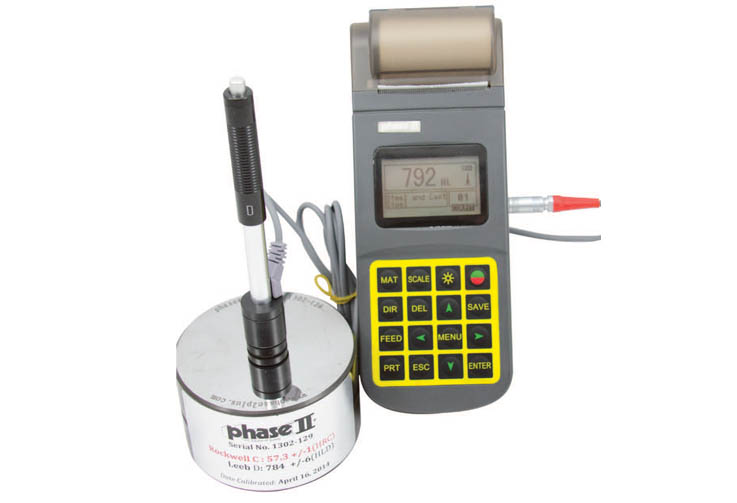Advantages of Portable Hardness Testers
Manufacturers and quality control managers do not always have the luxury of cutting materials into a sample and taking it into a lab for examination. A different solution is needed for field testing materials. Many manufacturers use portable hardness testers, which offer several other advantages.
What is Hardness Testing?
Hardness testing is used in mechanical and materials engineering to test the hardness of a material, such as a metal. Hardness tests analyze a specific material and its properties and ascertain whether or not a given material is the best fit for the job. Hardness tests are used on multiple kinds of materials, including carbon fiber, stainless steel, and even plastic. These materials’ resistance to force determines their use, lifespan, and ability to cope with general wear and tear.
Hardness testing is performed with stationary and portable hardness testers. Most portable hardness testers implement either the ultrasonic contact impedance method or the rebound method. The measurements created by these portable hardness testers are recalculated into hardness values of Rockwell, Brinell, Vickers or Shore scales.
Ultrasonic hardness testers are based on the measurements of the frequency of the indenter-free oscillations. Portable ultrasonic hardness testers consist of a probe and an electronic module. The rebound method uses a direct indentation. For example, the Brinell hardness tester uses a steel or hard-alloy ball of a known diameter to create an indentation with a known pressure. The measurements from the Brinell hardness tester are based on the penetration of the indenter into the tested material under load and consequent measurement of the mean diameter of the restored indentation.
Though a stationary tester provides more direct measurements, portable hardness testers have several advantages over their stationary lab cousins.
Portable hardness testers can be used outside the lab, in a variety of settings
When using a traditional large stationary hardness tester, samples must be brought to the testing equipment. This may not be possible in many situations , so portable testers can be used. Portable hardness testers are suitable for conducting measurements in the field, including chemical utilities, small factories, and existing pipelines. Portable hardness testers are especially useful for immovable equipment that cannot be brought to a testing lab or have samples cut off. They can measure hardness directly on a manufactured detail and in hard-to-reach places.
Only require a small surface area to provide measurement
Portable hardness testers can be used on much smaller surface areas than traditional hardness testers. Furthermore, they cab test individual parts of one material, e.g., a piece of metal attached to or on the surface of larger pieces of equipment.
What are the benefits of this? This ensures the materials testing is tested to the max of quality control on-site. Using a portable hardness tester on a small surface area lets you know the strength of the material, whether or not it will work, and how best to use it.
Lower Cost
The general cost of acquiring and using portable hardness testers is lower than that of stationary testers. This makes portable hardness testers more profitable and efficient when factoring in job/production costs.
Unlike traditional hardness testers, portable hardness testers are generally much easier to use and teach to employees. This can increase their utilization and improve efficiency in the workplace. Portable hardness testers also prevent back-and-forth hauling of equipment and material being tested between testing facilities. Performing the hardness test on-site can save transportation and insurance costs, as well as on-the-job work costs.
One Drawback of Portable Hardness Testers
An important consideration when looking at hardness testers is whether your manufacturing or inspection investigation requires simply verifying the hardness of a material or actually certifying that part to comply with a regulatory standard such as ISO or ASTM. If a part needs to be certified, then traditional benchtop hardness testing is required.
ASTM is discussing certification standards for portable hardness testers, but currently parts and materials can only be certified with stationary hardness testers. We expect this to change in the future, but it’s the biggest drawback to portable hardness testers today.
Conclusion
The portability, ease of use, and lower cost are advantages of portable hardness testers. Portable hardness testers are a great investment because they can be used on job sites were taking a sample and transporting it to a lab is either not possible or is costly. However, you need to make sure the portable tester is being used for quality verification purposes and not certification.
Metallurgical Supply Company (METSUCO) has been a leading supplier of portable hardness testers for over 30 years. We serve not only industries such as oil and gas, aerospace, automotive, and heavy manufacturing, but also universities and quality testing labs. Call 713-827-0700 or email sales@metsuco.com with inquiries.

